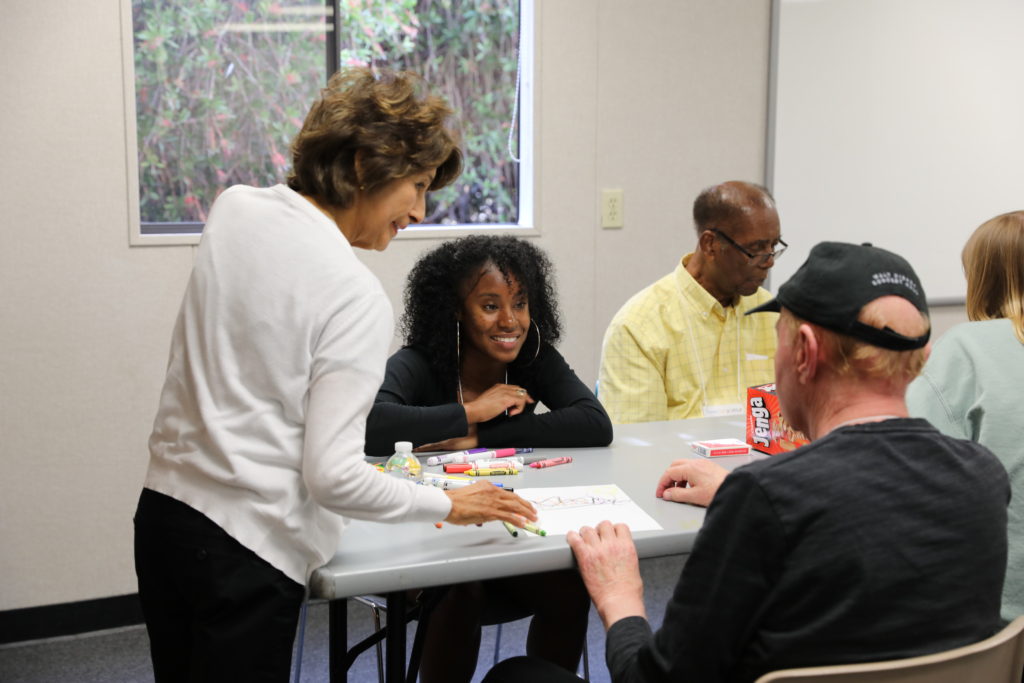Grant Spotlight: TimeOut@UCLA
December 12, 2017
“Sounds like someone just won Jenga,” says Pedro Jimenez as wooden blocks crash amid cheers.
The cheers are coming from two UCLA students and two older adults. At the next table, another intergenerational group is chatting, while another table is covered in markers and activity sheets.
Pedro surveys the scene with a smile on his face. For almost two years, he has served as program manager for TimeOut@UCLA, a program that brings together students and patients with mild dementia from UCLA’s Alzheimer’s and Dementia Care Program.
“We pair a student with a senior based on similar interests,” he says. These pairs will see each other throughout the quarter at TimeOut’s weekly sessions. Last year, the program hosted almost 100 pairs, and is on track for similar success this year.
To facilitate connections, a variety of activities are provided but not required during the hours they spend together. “We don’t structure things that much. We try to give them free reign,” says Pedro.
Dr. Zaldy Tan, an Assistant Dean at the UCLA medical school who oversees the program, knew that many students didn’t have regular opportunities to engage with older patients. “We have thousands of undergrads for whom we want to provide a rich experience,” he says. “It’s not only in the classroom.”
As Director of the Alzheimer’s and Dementia Care Program, Dr. Tan also knew how beneficial the intergenerational interactions would be for the older patients. “The seniors are in a safe and stimulating environment, and they have a reason to get up and get dressed to come to UCLA. It’s really a win-win.”
Al Cabrera has only brought his 88-year-old mother to the program for a short time, but he already plans to regularly return. “I like this, it stimulates her, and anything like that is better than her sitting at home and watching TV.”
Many of the students who volunteer for the program are hoping to work in the medical field. And according to the program’s student surveys, volunteers often come away with a stronger affinity for working with older populations.
Bronson Barretto is a gerontology student at UCLA who has volunteered with TimeOut for almost a year. “I like this because it’s a really different environment from the hospital. It’s more one-on-one.”
When he started the program, Bronson was paired with Don. “It was a little hard at first, but we started out talking about sports. It was a great conversation starter and from there he opened up a bit more. I know he doesn’t remember all of our conversations, but he remembers my name, which makes me feel pretty good.
“I like seeing Don every week. I look forward to it.”
The patients’ caregivers look forward to the program as well. “The caregivers have come to me countless times to tell me how much they appreciate having something like this,” Pedro says. “For a few hours a week they can bring their loved one to a safe space and run errands, take care of their own health, or simply relax.”
In fact, the program has started a caregiver support group that meets while the seniors are with the students. “Caregiving can be such an isolating experience,” Dr. Tan says. “With a three-hour window to themselves, sometimes they don’t know what to do. One thing they really like is to find other caregivers, a place where they can interact and hear how others are dealing with it.”
And as those caregivers make connections of their own, the cheerful student-senior interactions over Jenga, board games and crosswords will continue.
